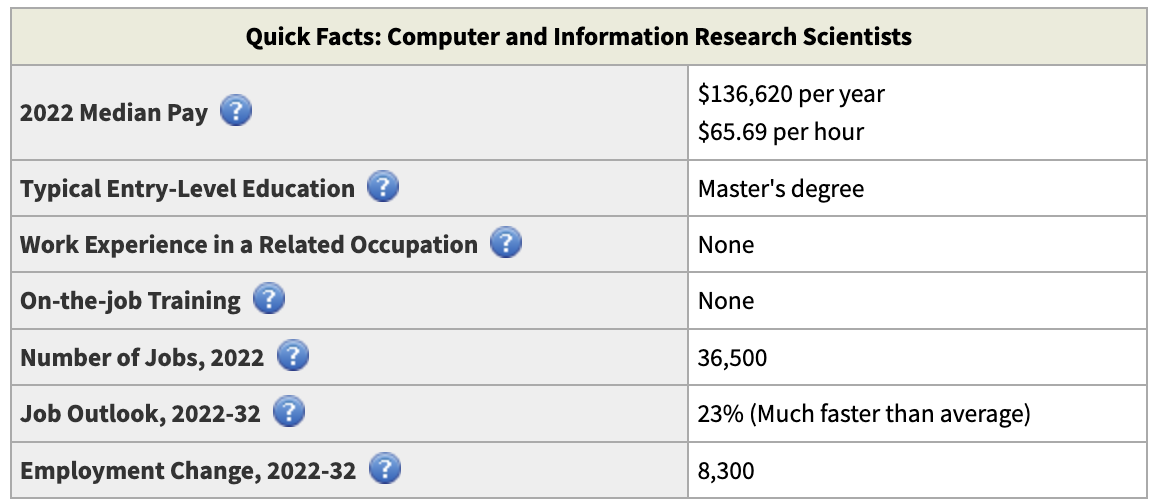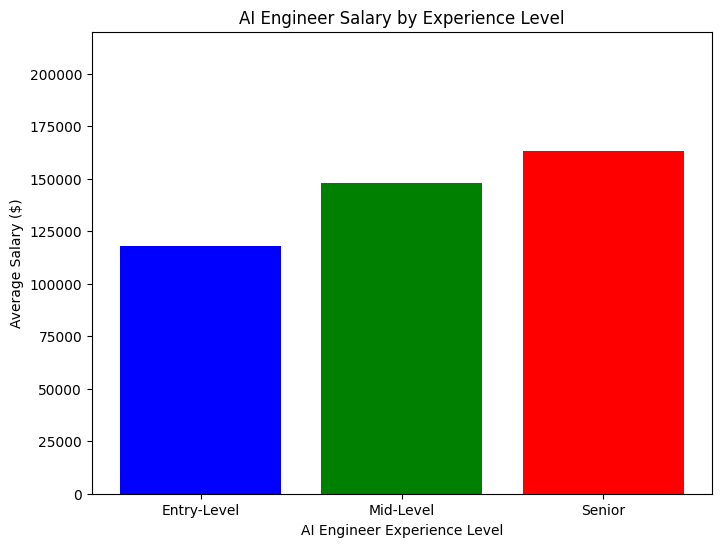Track
With such immense growth in artificial intelligence (AI) technologies in recent years, there's much potential for a lucrative career path as an AI engineer. But how much do AI engineers make?
We'll be sharing salary details in this comprehensive guide. We’ve gathered sources of AI engineer salaries to give you a better idea of how much they actually earn. We'll also explore some possible factors that may affect the pay of an AI engineer.
Read on for our detailed guide on how much AI engineers make.
Interested in becoming an AI engineer? Join our AI Fundamentals Track today and start your journey.
The AI Engineer Role
An AI engineer is an architect who uses machine learning, deep learning, and data science to build, test, and deploy AI models.
AI engineers typically collaborate with data scientists and other stakeholders, translating their data-oriented strategies into a production-level AI application.
Their responsibilities also include staying current with the industry's latest trends to enhance existing models and systems.
With the rise in huge advancements in large language models (LLMs) over recent years, the importance of AI in today's industry landscape is undeniable. Since the launch of OpenAI's ChatGPT, many companies have been scrambling to use these LLMs for their own AI products.
This has brought about a high demand for AI engineers with specialized skills in building and deploying these models, making it a highly sought-after and lucrative career path. You can read more about the essential AI engineer skills in a separate article.
The Global Impact of AI on the Economy
According to a recent study by PwC, the impact of AI will contribute $15.7 trillion to the global economy by 2030. This exponential growth in the AI industry will undoubtedly lead to an increase in job opportunities and higher salaries for AI engineers.
AI has seen many applications in tools like chatbots, virtual assistants, content generation, and even music generation. With the potential for AI to revolutionize many industries, it's no surprise that companies are willing to pay top dollar for skilled engineers in this field.

AI Engineers and similar roles are expected to grow over the coming decade - source
Average Salary of an AI Engineer
Let's now explore some of the actual salaries of AI engineers.
According to the US Bureau of Labor Statistics, the median salary for AI engineers in the United States is around $136,620 per year. These figures are consistent with Glassdoor, which reports that the average salary for AI engineers in the United States is $134,132 per year.
These are generous salaries compared to the national average, but it's worth noting that these figures are based on self-reported salaries from employees and may not accurately represent the entire population of AI engineers.
In comparison to the mean annual salary across all occupations in the US, which is at $61,900 per year, the AI engineer roles seem well paid. This is a strong indication of the growing demand for AI engineers and the value that companies place on these roles.
AI Engineer Job Outlook and Growth
For job outlook, the US Bureau of Labor Statistics, projects that AI careers will grow 21 percent from 2021 to 2031.
AI engineers are also expected to have versatile career options in different industries and are not confined to a single industry, with their expertise sought after in various fields.
- The technology sector remains the predominant employer as tech companies continue to innovate and integrate AI solutions into their products and services.
- Finance is another sector where AI engineers are expected to be in high demand. Artificial intelligence is extensively used in this field for predictive analysis, risk assessment, fraud detection, and portfolio management.
- The healthcare industry is also set to expand on its technological capabilities to develop AI systems for diagnosis, treatment recommendations, and even personalized medicine.
- Finally, the consulting industry is increasingly seeking AI engineers. As businesses across sectors strive to integrate AI into their operations, they often require the expertise of AI engineers to guide and implement these transformations.
This broad range of industries employing AI engineers attests to this profession's versatility and high demand.
Factors Influencing AI Engineer Salaries
While we’ve seen the average that AI engineers can expect to make, in reality, there are many factors that determine what your actual salary will be. Here are some of the key determiners:
Experience
When it comes to the salary range of an AI engineer, the largest contributing factor is experience. As with most jobs, the more experience you have, the higher salary you can command.

Entry-level AI engineers may start at around $118,166 per year and can expect steady increases as they gain more experience.
Mid-level AI engineers with 3-5 years of experience typically earn an average of $147,880 per year.
Senior AI engineer roles are rare but have an average salary of $163,037 per year, with some going up to as high as $200,000 per year.
Having relevant working experience in data science can demonstrate a good understanding of how machine learning models work as well as more advanced neural networks. Therefore, AI engineers can start out as data professionals like data scientists first.
Industry
Just like every other cross-functional role, the salary of an AI engineer differs based on the industry they work in.
The top-paying industries for AI engineers, according to Glassdoor, are Information Technology ($194,962), Media & Communication ($190,272), and Government & Public Administration ($112,123).
Industries such as technology tend to have higher salaries due to the high demand for AI engineers in these fields and their potential impact on company operations. Finance companies within the technology space also tend to have higher compensation for employees.
Location
Present the salary differences based on major US cities and the influence of cost of living on these figures.
The location in which an AI engineer works also plays a significant role in their salary. In major US cities, the cost of living can vary greatly, leading to differences in compensation for AI engineers.
According to Glassdoor, San Francisco has the highest average salary for AI engineers at $182,322 per year. This is followed by New York City ($159,467).
On the other hand, cities with lower costs of living, such as Atlanta ($128,917) and Austin ($109,598), have comparatively lower salaries for AI engineers.
It's essential to consider the cost of living when evaluating salary offers, as the same salary may have different levels of purchasing power in other locations.
Tips for Boosting Your AI Engineer Salary
If you're aspiring to become an AI engineer or looking to increase your salary, there are a few things you can do:
Learn new programming languages and tools
Staying up-to-date with the latest programming languages and tools will make you more valuable to employers. Some good programming languages include Python, Javascript, Lisp, and Julia.
Some notable tools you can pick up include, PyTorch, TensorFlow, LangChain, and OpenCV.
Learning these languages will help you in improving your chances of impressing employers in the technical interview process. This might help you negotiate for a higher salary.
Develop skills in areas of high demand
You should also develop strong expertise in specific skills related to different AI research topics and fundamentals.
Enhancing your skill set in AI not only broadens your understanding of key concepts but also opens doors to career advancement and potential salary growth. By diving into specialized areas such as generative AI and large language models, you're investing in your professional development. If you're looking for a resource to guide you through these complex topics, our AI Fundamentals Track offers a structured learning path.
Network and build connections
To help boost your chances of landing high-paying jobs, you’ll need to participate in industry events and conferences to network with other professionals. This will help you stay updated on the latest developments in the field.
Moreover, if you’re out there networking with other professionals in the AI development space, you’re likely to encounter job positions that have not even been listed on any job boards.
Consider certifications
Certifications can demonstrate your expertise and commitment to continuous learning of AI topics. This willingness to self-learn at a fast pace can be beneficial when applying for companies looking to hire senior positions. The AI industry is moving fast and certifications can help plug that knowledge gap quickly.
If you’re doing a career switch with no previous background, you might consider formal advanced degrees. Pursuing a graduate degree in artificial intelligence or a related field can give you a competitive edge and open up higher-paying job opportunities.
AI vs. Non-AI Engineer Compensation
While AI engineers are in high demand and command competitive salaries, how do they compare to non-AI engineers?
According to Glassdoor, the average annual salary for a software engineer is $134,145, while that of a data scientist is $127,330. Comparatively, the average AI engineer salary is $147,880 per year.
This significant difference in compensation can be attributed to the specialized skills and expertise required for AI engineering roles. AI engineers are also expected to have experience in both data science and software engineering backgrounds. These could contribute to their low supply and higher demand (resulting in higher compensation).
As companies increasingly rely on AI technologies for their operations, the demand for skilled AI engineers continues to rise, leading to higher salaries compared to other related roles.
Final Thoughts
The job market for AI engineers is currently very competitive, with many companies looking for skilled professionals to fill open positions. As such, AI engineer salaries are expected to remain high and continue increasing as the field of artificial intelligence continues to grow.
Whether you're just starting in your career or looking to advance, pursuing a job in AI engineering can offer lucrative compensation and continued opportunities for growth and development.
With the right skills, experience, and networking, you can position yourself to receive competitive salaries and reach your career goals as an AI engineer too. Building up a career as an AI engineer takes years of experience, but if you start building your skills today, you'll be in a prime position to take advantage of future opportunities.
To help you get started, you might want to check out our AI tutorials, which wil help provide you more technical knowledge on AI. Alternatively, if you’re new to AI, our Understanding Artificial Intelligence course will be a good starting point.

I'm Austin, a blogger and tech writer with years of experience both as a data scientist and a data analyst in healthcare. Starting my tech journey with a background in biology, I now help others make the same transition through my tech blog. My passion for technology has led me to my writing contributions to dozens of SaaS companies, inspiring others and sharing my experiences.




